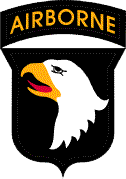
101st Airborne Division
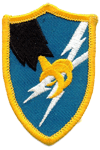
Army Security Agency
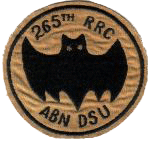
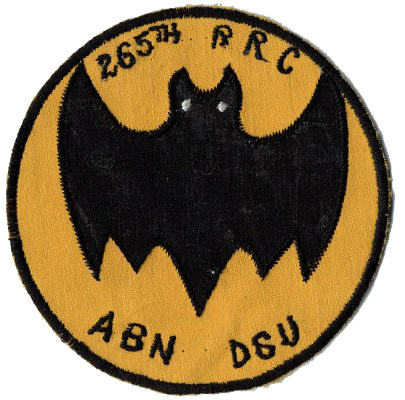
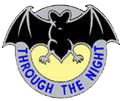
The "Bat" was our mascot and "Through the Night" our motto.
In 2010, I am celebrating my 42nd anniversary of my service in the Republic of Viet Nam (RVN). My service was with the 265th Army Security Agency which was attached to the 101st Airborne Division. Our mission was mainly that of radio security and surveillance. The men with whom I served were well educated and motivated to perform the job at hand. Although we were placed in "harm's way" during the peak of the Viet Nam conflict, I am proud to say that we had no incidents that resulted in the death of any of our members during the time that I served with the company. These men were a strong and highly motivated group. As part of this group, I served in a very modest enlisted position as did the majority of us. Much later, 2008, one of my high school friends said: 'You must have joined the 101st so that you could wear that "cool" patch.' I wish that it could have been so. I was assigned to the 101st Airborne Division by chance. A better "chance" could not have been given me. It is a fantastic "club" to which one could belong. Of the 1600 or so veterans that belong to my American Legion post, only about five of us are AIRBORNE. I am very proud to belong to this group of men.
My intent in writing about those times long ago is to document but a small part of which was apportioned to me. Time has a way of erasing memories and/or forgetting that which was important at the time. Upon the termination of the conflict, I remember stating to one of the band members while performing at Mark's Top cat, a Denver nightclub, "Good, it's finally over". My efforts went to the study of music and all of my memorabilia went into storage for thirty-seven years. It was not until the death of my mother and my appointment as executor of her will and my retirement that I found and took interest in what is presented here.
My interest in military history was always in the back ground of my thoughts. Since my retirement, I have chosen to study that subject matter more closely; including my own. I tell my story based upon the pictures posted and the memories that they have renewed. I continue to read and study past military history.
Like most young men, past and present, I was not excited with the prospect of having to serve in the armed forces; especially, during a time of war. I had had a taste of the music industry having signed a recording contract with Columbia Records and was becoming more connected within it. Military service was not even a thought until that fateful day that I got my draft notice. I skirted the matter for a bit and then enlisted for a four year hitch with the Army Security Agency (ASA). Below is special order 255 that was cut upon my enlistment:
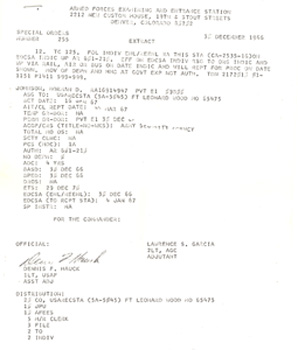
The history of the era is presented here:
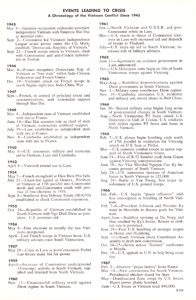
I would like to say up front that even though I had to endure some four years in the military and would sometimes like to take SSG James V. Betts to task on his presentation of what the army would be like. However, after forty-two years, I have forgiven him his mis-truths and deceptions that were used to meet his quotas for enlistment. I know, now, that he had to be subjected to much pressure from his superiors during this period of service. I would later go through eh same as a postmaster. Life is tough and then it get's tougher!
A few years after having been discharged, I ran into SFC Betts in the Federal Building in downtown Denver. I stopped him and teasingly gave him a bit of my mind. Of course, he didn't remember who I was but we did chat amicably for a few moments.
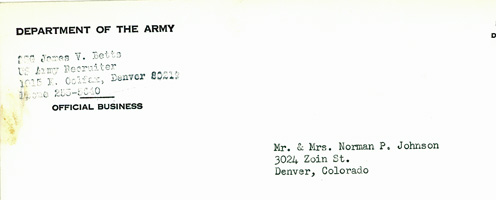
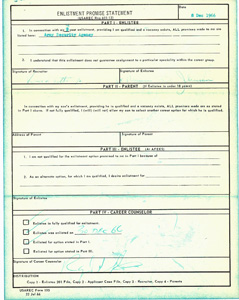
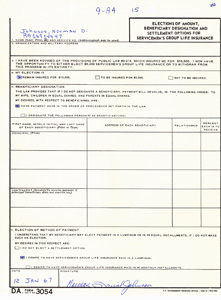
Even though I had signed up for the ASA, my enlistment was not secure until I had passed my security clearance. The ink had hardly had time to dry on my enlistment papers when I had to have an appendectomy which kept me home for about three weeks. I finally said good-bye to my family and friends in late December of 1966 and headed for Ft. Leonardwood, MO. I hadn't quite recovered completely from my surgery and was placed in a temporary position where I did office work.
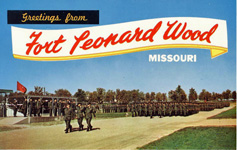
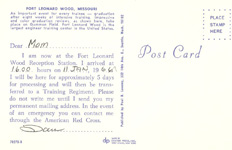
Required post card to be sent to one of your family.
After about another four weeks, I was medically cleared for boot camp. I was transferred to the "tender care" of Staff Sergeant Eddie Valez who took me and a group of national guard soldiers under his wing. As my father had given me the task of preparing his full field lay-out for inspection while in high school, I was better prepared than most and was awarded the position of "candy stripe" corporal for the platoon. My subordinates had a difficult time staying out of the beer garden. We were restricted to our barracks for the first few weeks of training and it would have been my butt in the sling had they been found out. The problem was that too many of them wanted to disappear at one time. We did a bit of negotiating and I'd allow a certain number to be gone as long as we were number one platoon. We were and the guys turned out to be a great bunch. We all survived the rigors of becoming an elite fighting machine.
My background security check still in progress, I transferred to the signal school at Ft. Gordon, GA. As the season changed from winter to spring to summer, life's luxuries didn't change for the better. I just moved from the cold and drafty WWII barracks of Ft. Leonardwood to the new and improved stifling hot and un air-conditioned barracks of Ft. Gordon. During my advanced individual training (AIC), classes went 24/7 due to the Vietnam war. I was assigned to the night classes and had to sleep during the heat of the day. We all learned to sleep on our side so as to get the maximum amount of air passing over one's body. Again, survival of the fittest!
In hopes that my next comment will not be regarded as a personally negative one, I will make my statement regarding my training for radio repair. I have always had a feeling of not being as competent in my repair duties as I would have liked to have been. Over the years, I have had nagging questions as to this subject matter. I recently read Colonel David Hackworth's book ABOUT FACE. I finally have come to understand what was going on with the training at Ft. Gordon and lots of other training facilities as well. Because of the tremendous need for more troops ('67-'68), the Army was attempting to push as many graduates through all of their training as possible. To have a high attrition rate was unacceptable and would ruin the career ladder of those in charge. Upon inspection, he states that in some areas of training this attrition rate was made to fall from 50% to 5%. Quite an improvement on paper.
It makes much better sense to keep your standards high and weed out those that either cannot hack the program or should be placed in another professional area. Due to my inability to tolerate what I deemed to be a stagnant job, I volunteered to work in the signal parts supply area where I could employ my administrative skills.
We all got along well together. I think that we had eight men per room. I happened to have some hair clippers and would practice cutting my friend's hair. One day, one of the guys said that he cut hair in civilian life and offered to give me a haircut. I agreed to a haircut and the guy got me a good one! He cut right down the middle of my head so that I had to have all the rest cut off as well. Dumb me!
Another story that I must relate is a statement by one of my buddies, Juan Banuet from San Diego, CA. "Now I know why I'm so tired every morning. The label on this army blanket says that it weighs 3.5 pounds."
I graduated on my 21st birthday and proudly received my diploma stating that I was a 31E20. In civilian language, that's a field radio repairmen. A short time later, I would add the letter "P" to that number for parachutist.
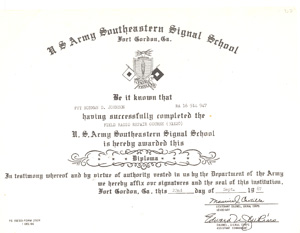
Radio repair school diploma
I've always tried my best to make the best of all situations. Ft. Gordon was no different. There was not much to do off the base and so we would hang out at the service club. There were lots of records and books there for our entertainment. They also provided musical instruments for us. I had purchased a 1954 Stratocaster for $100 at a pawn shop in Augusta, GA. and every week-end I would get together with mostly Black musicians and play the blues.(Oh, how I wish I had kept that guitar!) The size of the band would expand or contract depending on who was still in training. Regardless, we all had a good time and for me it was the opportunity of a life-time to learn this style of music. I couldn't get enough! My security clearance came through and I was just about finished with signal school. Here's some pictures from that time:
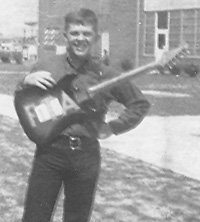
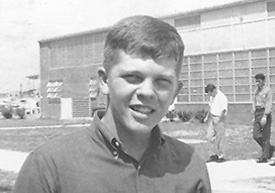
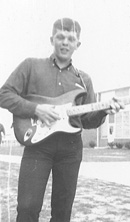
FTA: Future Teachers of America? Hangin' out in front of our barracks. Ditto!!
NEXT STOP: FT. CAMPBELL, KY
BACK TO MILITARY PAGE